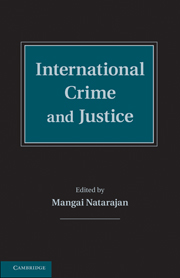Book contents
- Frontmatter
- Contents
- List of Figures
- List of Tables
- List of Contributors
- Foreword
- Preface
- Introduction
- Part I International Criminology
- Part II Law, Punishment, and Crime Control Philosophies of the World
- Part III Transnational Crime
- Part IV Organized Crime and Terrorism
- Part V International crime
- Part VI Delivering International Justice
- Part VII International Cooperation and Criminal Justice
- 54 World Policing Models
- 55 Crossborder Policing
- 56 Challenge and Transition
- 57 The European Union and Judicial Cooperation
- 58 The Longer Arm of the Law
- 59 International Cooperation to Combat Money Laundering
- Part VIII International Research and Crime Statistics
- Part IX International research resources
- World Map
- Index
- References
59 - International Cooperation to Combat Money Laundering
Published online by Cambridge University Press: 05 October 2014
- Frontmatter
- Contents
- List of Figures
- List of Tables
- List of Contributors
- Foreword
- Preface
- Introduction
- Part I International Criminology
- Part II Law, Punishment, and Crime Control Philosophies of the World
- Part III Transnational Crime
- Part IV Organized Crime and Terrorism
- Part V International crime
- Part VI Delivering International Justice
- Part VII International Cooperation and Criminal Justice
- 54 World Policing Models
- 55 Crossborder Policing
- 56 Challenge and Transition
- 57 The European Union and Judicial Cooperation
- 58 The Longer Arm of the Law
- 59 International Cooperation to Combat Money Laundering
- Part VIII International Research and Crime Statistics
- Part IX International research resources
- World Map
- Index
- References
Summary
MONEY LAUNDERING
Money laundering is a process that turns “dirty money” into “clean money.” The proceeds of crime – dirty money – are disguised to hide their illicit origins, and then the money is integrated into the legitimate economy. The process washes dirty money until it appears to be clean. Often, but not always, the cleaning of dirty money involves moving it across national borders and integrating it into another economy.
Criminals disguise the illegal origins of their wealth, and terrorist organizations try to conceal the destination and the purpose for which the money has been collected. Money laundering plays a part in corruption as corrupt public officials need to hide the kickbacks they receive and the public funds they may have misappropriated. Organized criminal groups have substantial proceeds from drug trafficking and commodity smuggling. Together, these activities have profound social consequences and require cooperative international activity to combat them.
There is a great deal of international and national activity to counter financial crime and money laundering. Legislation exits in most countries to criminalize money laundering and the associated activities such as opening accounts in false names. Law enforcement agencies have investigated and prosecuted those accused of money laundering and prison sentences have been imposed. Money laundering is certainly big business and is significant for many economies. In its Global Anti-Money Laundering Survey 2007, KPMG opens with these words: “Estimated money laundering flows are reported to be in excess of US$1 trillion being laundered every year by drug dealers, arms traffickers and other criminals” (KPMG, 2007:4).
- Type
- Chapter
- Information
- International Crime and Justice , pp. 445 - 452Publisher: Cambridge University PressPrint publication year: 2010
References
- 1
- Cited by



